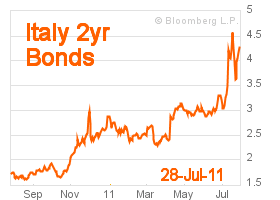European leaders have long expressed confidence that the US would find a resolution to its ongoing debt impasse. But now there is growing concern that it won’t, according to Spiegel. German Finance Minister Wolfgang Schäuble says, “Everyone in the US should be aware of their responsibility for the global financial markets.”
 Angela Merkel and Wolfgang Schäuble in June (AP)
Angela Merkel and Wolfgang Schäuble in June (AP)
Schäuble added a laugh line: “In the euro-zone we haven’t managed to solve all of our problems. But we have at least taken an important step.”
|
|
 |
|
|
As we’ve been reporting, the default of Greece’s debt as certain, and contagion to Italy and Spain is also certain. It took only four days to show that the markets were unconvinced by last week’s bailout, and Italy’s bond yields are continuing their inexorable rise again.
The picture above shows German Chancellor Angela Merkel talking with German Finance Minister Wolfgang Schäuble talking in June about the bailout deal. At that time, the Germans were demanding that investors holding Greek bonds would have to be required to take a “haircut,” losing some of the principal in their investment.
As the deal was finally announced last week, the “haircut” would be 21%, but it would be “voluntary.” Investors, mostly banks, will swap their old, rotten Greek bonds for shiny new Greek bonds backed by the EU, and theoretically therefore immune to default, though when you do the math, the haircut will be much larger (see “24-Jul-11 World View — Mauldin: Greece’s bond ‘haircuts’ are at 75-80%”).
In case you’re wondering, all this “voluntary” bond swapping hasn’t taken place yet. It’s supposed to take place at the end of August. So there’s nothing about last week’s bailout plan that’s been implemented yet, despite Schäuble’s claim that Europe is solving its problems.
Downgrading the U.S. credit rating
It’s becoming increasingly accepted that America’s AAA credit rating is soon going to be downgraded, irrespective of how the debate over the debt ceiling goes. This is because S&P Rating Service has announced that a downgrade will occur unless the government takes significant steps to reduce the debt to GDP ratio.
Fox News on Thursday evening reported on the paraphrased transcript of a conference call with S&P, in which the following was said:
QUESTION: “$4 trillion number has been circulating to stabilize the debt-GDP ratio. Where does this number come from?”
S&P RATINGS SERVICE: “It came from Bowles-Simpson (deficit/debt commission) and was embraced by President Obama and Rep. Paul Ryan.
Actually, $4 trillion won’t do the trick to stabilize debt to GDP, but would take you far along and signal seriousness. IMF says you need 7.5% of GDP to stabilize, we think it’s a little more than that. Four trillion dollars would be a good down payment.”
These figures weren’t explained, but I believe that the $4 trillion is a 10-year figure, while the 7.5% is an annual figure. Thus, if the GDP is around $14 trillion per year, then 7.5% each year for 10 years would come to $10.5 trillion.
Now, it’s pretty obvious that even the $4 trillion figure won’t be reached, so S&P may have already committed itself to downgrading the U.S. credit rating.
The lowering of America’s AAA credit rating is different from default. If an agreement is reached in the next few days to raise the debt ceiling, then default will have been averted. However, the credit rating can still be lowered because the U.S. is spending a lot more than it takes in.
The Europe crisis versus the American crisis
There are parallels between the situations in Europe and America, with America about a year behind Europe in dealing with the problems. I believe that we can expect America to follow the European example in many ways, such as the following:
- The bitter political fight in Washington between Republicans and Democrats roughly parallels the bitter political fight in Europe between Germany and France.
- A large section of the German electorate were steadfastly opposed to any further bailout of Greece, while a large section of the American electorate (the Tea Party) are steadfastly opposed to any further increases in federal government spending.
- Thus, the anti-bailout section of the Germany electorate are roughly parallel to America’s Tea Party.
- In the past few months, the mainstream media has been vitriolically critical of the Germans for demanding large, mandatory austerity measures for Greece, and hard “haircuts” for investors in Greek bonds. The Germans have been portrayed as wanting/willing to destroy Europe altogether.
- The mainstream media is vitriolically critical of the Tea Party, calling them “terrorists,” and saying that they’re willing to destroy the entire American financial system and throw us into a new Great Depression.
- The deal that was finally reached in Europe was no more than a temporary fix, but the mainstream media has portrayed it as the Germans caving in to pressure.
- I (and most other people) expect that a deal will be worked out in Washington. I expect that the deal will be only temporary (whether for 6 months or 18 months is unclear), and I expect that the mainstream media will blame the Republicans and the Tea Party for holding up the deal, until they were forced to cave in.
It’s such as shame that Schäuble and the Europeans are losing patience with us. You just know how I hate to see that. But once a debt ceiling agreement is reached, then we can all go back to focusing on Europe’s problems again, because as bad off as America as, the Europeans are in far worse trouble.
Are there any adults in the room?
The vomit-inducing activities going on in Washington these days are causing people to wonder, “Are there any adults in the room?” with respect to the budget ceiling talks.
Long-time readers know that I’ve been critical of President Barack Obama not for his ideology but because of his youthfulness, and his Gen-Xer nihilism. Obama has been in way over his head ever since he became President, though he’s learned a lot on the job. But no one seriously believes that he’s shown leadership in the current crisis.
As I’m typing this, I’m watching the Gen-Xer Rand Paul, the Republican senator from Kentucky, explaining why he will absolutely, positively not vote for any bill that doesn’t sharply reduce spending, irrespective of whether it forces the government into default.
Back in the 1980s, the Silent generation leaders in government could get together and reach a compromise to save social security. Today, with the Gen-Xers in charge, it’s nihilism rather than compromise that’s ruling.
Cyprus government near collapse over economic crisis
|
|
 |
|
|
Cyprus President Demitris Christofias is refusing to step down, just hours after demanding the resignations of his entire cabinet. “The people have elected me, and I am accountable to those who have elected me,” he said, after being asked if he would resign. Cyprus is near bankruptcy after Moody;’s downgrade of its debt, due to “fractious politics” and the fact that its huge banking system is heavily exposed to Greek bonds. Ambrose Evans-Pritchard and Famagusta Gazette
COMMENTS
Please let us know if you're having issues with commenting.